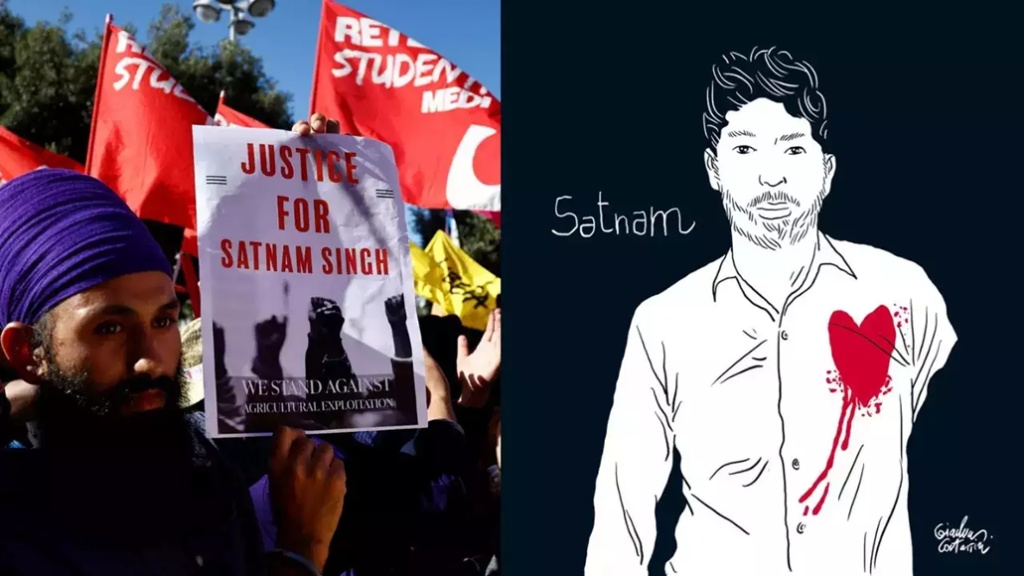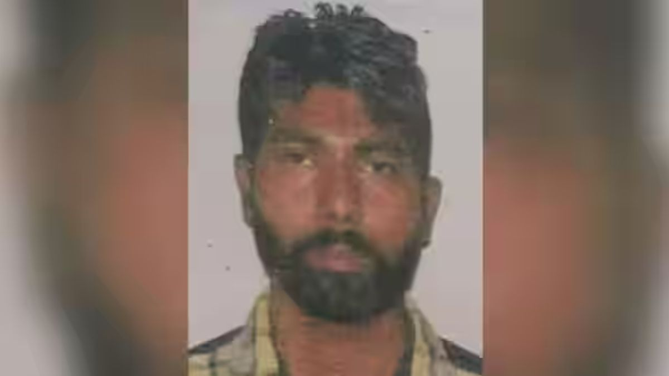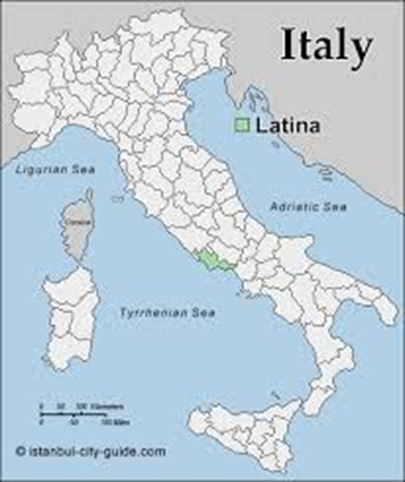In a tragic incident, a 31-year-old Indian casual worker in Italy died tragically after he was dumped on the road without medical assistance by his employer after his arm was severed by heavy farm machinery. Satnam Singh was injured by heavy machinery while working in a vegetable field in Lazio, near Rome.
Indian Worker’s Death In Italy
Why In News
- In a tragic incident, a 31-year-old Indian casual worker in Italy died tragically after he was dumped on the road without medical assistance by his employer after his arm was severed by heavy farm machinery. Satnam Singh was injured by heavy machinery while working in a vegetable field in Lazio, near Rome.
What All Happened
- Satnam Singh was one of the thousands of Indians working illegally on farms in Italy, especially in the Pontine Marshes area. They are underpaid, and women are even at risk of sexual exploitation. Singh’s death highlighted the brutal exploitation of undocumented migrants in Italy.
- According to Ministry of External Affairs data in May 2024, there are over 2 lakh overseas Indians in Italy. The number of documented Indians in Italy is highest in continental Europe just after Germany.
- “He was thrown out like a dog. There is exploitation every day, we suffer it every day, it must end now,” Gurmukh Singh, head of the Indian community in the Lazio region of central Italy, was quoted by AFP as saying. “We come here to work, not to die,” he added.
- Latina, where Satnam Singh was working, is infamous for exploitation of migrant workers. Singh’s accident and him being dumped by his employers to die, has highlighted the exploitation and shaken some Italians.
- Italy Prime Minister Giorgia Meloni condemned Singh’s death as inhumane and barbaric.
- “These are inhumane acts that do not belong to the Italian people, and I hope that this barbarism will be harshly punished,” Meloni said.
- Labour Minister Marina Calderone called the incident “a true act of barbarity” in the Italian Parliament.
- Calderone said authorities were investigating the incident and hoped those responsible for the act would be punished.
- The centre-left Democratic Party called Singh’s death a “defeat for civilisation”.
Will Italy Go Beyond LIP SERVICE
- Indians have worked in the Agro Pontino since the mid-1980s, harvesting pumpkins, leeks, beans and tomatoes, and working on flower farms or in buffalo mozzarella production.
- Trade union representatives met minister Calderone and Agriculture Minister Francesco Lollobrigida to discuss how such incidents could be prevented.
- Trade unions organised a protest and a two-hour strike in Latina, demanding “dignity and respect for the health and safety of workers”. They also organised a fundraiser for Singh’s family.
- India’s Ministry of External Affairs said “deep concern” about the death of Satnam Singh had been conveyed to its Italian counterpart and prompt action against those responsible had been sought.
- The MEA said that the Indian Embassy was in contact with family of Satnam Singh for consular help and transportation of his mortal remains to India.
Why Indians Working In Italy Farms Are At Risk
- Latina, a city in a rural area south of Rome, is home to tens of thousands of migrant workers from India.
- Children held up colourful posters, reading “Justice for Satnam Singh” as the procession of Indian workers snaked through Latina, reports AFP.
- The lack of labour contracts deters employers from getting medical help for undocumented migrant workers, because they could get into legal troubles.
- “My boss said he couldn’t take me to hospital because I didn’t have a contract,” Parambar Singh, whose eye was injured at work, told AFP.
- “Satnam died one day, I die every day. Because I too am a labour victim,” said the 33-year-old Indian. He has been struggling to work since the accident 10 months ago. The exploitation is a result of a gangmaster system that supplies labour to worker-starved farms.
- PM Giorgia Meloni said Italy’s visa system was being exploited by organised crime groups to smuggle in illegal migrants.
- Just 30% of workers given visas by Italy actually travel to the country to work, according to Confagricoltura agribusiness association. This shows why Italian farms face shortages.
- It is the lack of contracts for illegal migrants which is at the root of the exploitation of Indians in Italy.
- The country’s largest trade union, CGIL, estimates there are around 230,000 agricultural workers without contracts.
- “We all need regular job contracts, not to be trapped in this slavery,” said Akveer Kaur, one of the protesting migrant workers from India. Satnam Singh, she said, should be the last Indian to die such a death in Italy.
‘Capo’ system & lack of cohesion
- Many who took part in the solidarity marches admitted to entering Italy illegally, or through the “Donkey” route for which they paid anywhere between Rs 15 and Rs 18 lakh.
- In the case of Italy, there are two well-known routes for illegal entry: via boats (mostly from North Africa); or securing a Turkish tourist visa and then travelling to Armenia, Greece or Croatia, from where one can board ‘taxis’ operated by European Union (EU) residents.
- Those from India’s Punjab usually prefer the Croatian route. Satnam and his companion, too, had opted for the same.
- Though there is no official estimate as to how many Indians are living in Italy illegally, in his speech initiating the solidarity march held in Latina Tuesday, local Punjabi activist Balkar Singh said, “The governments for sure know what’s happening. When they themselves issue visas to only 1.5 lakh people, how come we have 5 lakh of them here?”
- Under the ‘Caporalato’ system at play here, criminal intermediaries, mostly linked to the Mafia, recruit illegal migrants as workers.
- Though official estimates by the Italian government peg the number at 60,000, a report by Wired suggests there are about 2.3 lakh workers in the Italian ‘Caporalato’ system.
- Claims have also come to light of illegal migrants being paid €20 (or Rs 1,700) per day for 10-14 hours of back-breaking work. However, most agricultural workers ThePrint spoke to said the minimum wage is €5-6 an hour, for five to six hours of work each day.
- Needless to say, working conditions are vastly different for those living in the country illegally. This is where the ‘Padrone’ (Italian word for master) comes into the picture.
- They allegedly take away workers’ documents (if any) to ensure they don’t leave the fields, under-pay them, and undercut their working hours. They keep workers in line and engaged in farmwork for prolonged hours by threatening to inform police about their illegal immigrant status. But Italian ‘masters’ are not the only ones immigrant workers fear.
- “No doubt that Italian masters who indulge in such practices are atrocious, but what hurts us more is that our own people exploit us on their behalf,” said Satpal.
- He explained that when an immigrant, usually an Indian, has worked for an Italian ‘master’ for 20-25 years, he is made an ‘intermediary’ who is supposed to update the ‘master’ every half hour about the goings-on on the farm. “They are given targets to achieve and they will do whatever it takes to fulfil the targets, even at the cost of exploiting their own brethren. These intermediaries also get extra cash for doing such jobs.”
















